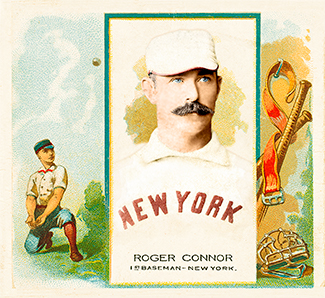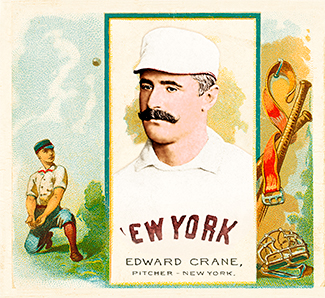- Series: 1888 Champion New York Giants
- City: New York
- Team: Giants
- League: National League
- Hall: National Baseball Hall of Fame
Roger Connor (1857-1931) was the home run king of the 19th century, clouting 138 in his 18-year career. His record stood for 23 years after his retirement, until Babe Ruth surpassed him in 1921. Connor anchored first-base for five teams, winning pennants twice with the Giants. His flair for the dramatic was never more evident than when he struck the first-ever major league grand slam with his team down by three with two outs in the ninth. Born in Connecticut, Roger played for local clubs until joining the Troy Trojans in 1880. That NY hamlet witnessed five future Hall of Famers on their squad with Connor playing alongside Dan Brouthers, Buck Ewing, Tim Keefe and Mickey Welch. After moving to the Gothams, the 6’3” Connor inspired owner Jim Mutrie to proclaim the team “my giants!” and a new identity was born.
- Much more than a slugger, Connor won the NL batting title in 1885 and consistently hit .300+ while exhibiting remarkable speed for a big man (still fifth all-time in triples)
- Connor lived to see Ruth claim his HR title. It was thought at the time, however, that Connor had hit 131 HRS and Ruth's record was celebrated at 132. Writing for SABR in 1975, John tattersall discovered that Connor had actually hit 138 HRs.
- Jay Jaffe's JAWS system ranks Connor as the 5th greatest 1st baseman of all-time, just behind Cap Anson and just ahead of Jeff Bagwell
- Beloved by fans and the baseball press, he had a particularly strong advocate for the Hall in fellow legend, umpire Bill Klem
- Elected to Hall of Fame: 1976

